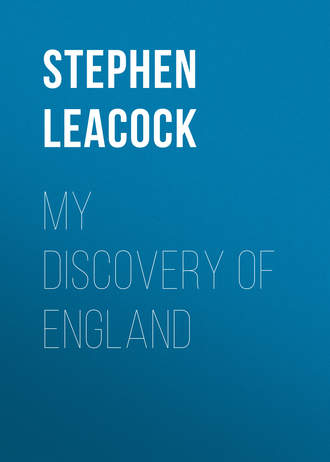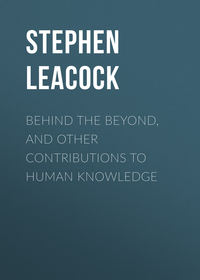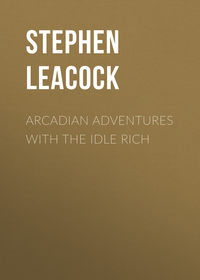 полная версия
полная версияMy Discovery of England
I decided therefore to take some simple political event of the peculiar kind that always makes a stir in English politics and write it up for these English papers. To simplify matters I thought it better to use one and the same incident and write it up in three different ways and get paid for it three, times. All of those who write for the Press will understand the motive at once. I waited therefore and watched the papers to see if anything interesting might happen to the Ahkoond of Swat or the Sandjak of Novi Bazar or any other native potentate. Within a couple of days I got what I wanted in the following item, which I need hardly say is taken word for word from the Press despatches:
"Perim, via Bombay. News comes by messenger that the Shriek of Kowfat who has been living under the convention of 1898 has violated the modus operandi. He is said to have torn off his suspenders, dipped himself in oil and proclaimed a Jehad. The situation is critical."
Everybody who knows England knows that this is just the kind of news that the English love. On our side of the Atlantic we should be bothered by the fact that we did not know where Kowfat is, nor what was the convention of 1898. They are not. They just take it for granted that Kowfat is one of the many thousand places that they "own," somewhere in the outer darkness. They have so many Kowfats that they cannot keep track of them.
I knew therefore that everybody would be interested in any discussion of what was at once called "the Kowfat Crisis" and I wrote it up. I resisted the temptation to begin after the American fashion, "Shriek sheds suspenders," and suited the writing, as I thought, to the market I was writing for. I wrote up the incident for the Morning Post after the following fashion:
"The news from Kowfat affords one more instance of a painful back-down on the part of the Government. Our policy of spineless supineness is now reaping its inevitable reward. To us there is only one thing to be done. If the Shriek has torn off his suspenders he must be made to put them on again. We have always held that where the imperial prestige of this country is concerned there is no room for hesitation. In the present instance our prestige is at stake: the matter involves our reputation in the eyes of the surrounding natives, the Bantu Hottentots, the Negritos, the Dwarf Men of East Abyssinia, and the Dog Men of Darfur. What will they think of us? If we fail in this crisis their notion of us will fall fifty per cent. In our opinion this country cannot stand a fifty per cent drop in the estimation of the Dog Men. The time is one that demands action. An ultimatum should be sent at once to the Shriek of Kowfat. If he has one already we should send him another. He should be made at once to put on his suspenders. The oil must be scraped off him, and he must be told plainly that if a pup like him tries to start a Jehad he will have to deal with the British Navy. We call the Shriek a pup in no sense of belittling him as our imperial ally but because we consider that the present is no time for half words and we do not regard pup as half a word. Events such as the present, rocking the Empire to its base, make one long for the spacious days of a Salisbury or a Queen Elizabeth, or an Alfred the Great or a Julius Caesar. We doubt whether the present Cabinet is in this class."
Not to lose any time in the coming and going of the mail, always a serious thought for the contributor to the Press waiting for a cheque, I sent another editorial on the same topic to the Manchester Guardian. It ran as follows:
"The action of the Shriek of Kowfat in proclaiming a Jehad against us is one that amply justifies all that we have said editorially since Jeremy Bentham died. We have always held that the only way to deal with a Mohammedan potentate like the Shriek is to treat him like a Christian. The Khalifate of Kowfat at present buys its whole supply of cotton piece goods in our market and pays cash. The Shriek, who is a man of enlightenment, has consistently upheld the principles of Free Trade. Not only are our exports of cotton piece goods, bibles, rum, and beads constantly increasing, but they are more than offset by our importation from Kowfat of ivory, rubber, gold, and oil. In short, we have never seen the principles of Free Trade better illustrated. The Shriek, it is now reported, refuses to wear the braces presented to him by our envoy at the time of his coronation five years ago. He is said to have thrown them into the mud. But we have no reason to suppose that this is meant as a blow at our prestige. It may be that after five years of use the little pulleys of the braces no longer work properly. We have ourselves in our personal life known instances of this, and can speak of the sense of irritation occasioned. Even we have thrown on the floor ours. And in any case, as we have often reminded our readers, what is prestige? If any one wants to hit us, let him hit us right there. We regard a blow at our trade as far more deadly than a blow at our prestige.
"The situation as we see it demands immediate reparation on our part. The principal grievance of the Shriek arises from the existence of our fort and garrison on the Kowfat river. Our proper policy is to knock down the fort, and either remove the garrison or give it to the Shriek. We are convinced that as soon as the Shriek realises that we are prepared to treat him in the proper Christian spirit, he will at once respond with true Mohammedan generosity.
"We have further to remember that in what we do we are being observed by the neighbouring tribes, the Negritos, the Dwarf Men, and the Dog Men of Darfur. These are not only shrewd observers but substantial customers. The Dwarf Men at present buy all their cotton on the Manchester market and the Dog Men depend on us for their soap.
"The present crisis is one in which the nation needs statesmanship and a broad outlook upon the world. In the existing situation we need not the duplicity of a Machiavelli, but the commanding prescience of a Gladstone or an Alfred the Great, or a Julius Caesar. Luckily we have exactly this type of man at the head of affairs."
After completing the above I set to work without delay on a similar exercise for the London Times. The special excellence of the Times, as everybody knows is its fulness of information. For generations past the Times has commanded a peculiar minuteness of knowledge about all parts of the Empire. It is the proud boast of this great journal that to whatever far away, outlandish part of the Empire you may go, you will always find a correspondent of the Times looking for something to do. It is said that the present proprietor has laid it down as his maxim, "I don't want men who think; I want men who know." The arrangements for thinking are made separately.
Incidentally I may say that I had personal opportunities while I was in England of realising that the reputation of the Times staff for the possession of information is well founded. Dining one night with some members of the staff, I happened to mention Saskatchewan. One of the editors at the other end of the table looked up at the mention of the name. "Saskatchewan," he said, "ah, yes; that's not far from Alberta, is it?" and then turned quietly to his food again. When I remind the reader that Saskatchewan is only half an inch from Alberta he may judge of the nicety of the knowledge involved. Having all this in mind, I recast the editorial and sent it to the London Times as follows:
"The news that the Sultan of Kowfat has thrown away his suspenders renders it of interest to indicate the exact spot where he has thrown them. (See map). Kowfat, lying as the reader knows, on the Kowfat River, occupies the hinterland between the back end of south-west Somaliland and the east, that is to say, the west, bank of Lake P'schu. It thus forms an enclave between the Dog Men of Darfur and the Negritos of T'chk. The inhabitants of Kowfat are a coloured race three quarters negroid and more than three quarters tabloid.
"As a solution of the present difficulty, the first thing required in our opinion is to send out a boundary commission to delineate more exactly still just where Kowfat is. After that an ethnographical survey might be completed."
It was a matter not only of concern but of surprise to me that not one of the three contributions recited above was accepted by the English Press. The Morning Post complained that my editorial was not firm enough in tone, the Guardian that it was not humane enough, the Times that I had left out the latitude and longitude always expected by their readers. I thought it not worth while to bother to revise the articles as I had meantime conceived the idea that the same material might be used in the most delightfully amusing way as the basis of a poem far Punch. Everybody knows the kind of verses that are contributed to Punch by Sir Owen Seaman and Mr. Charles Graves and men of that sort. And everybody has been struck, as I have, by the extraordinary easiness of the performance. All that one needs is to get some odd little incident, such as the revolt of the Sultan of Kowfat, make up an amusing title, and then string the verses together in such a way as to make rhymes with all the odd words that come into the narrative. In fact, the thing is ease itself.
I therefore saw a glorious chance with the Sultan of Kowfat. Indeed, I fairly chuckled to myself when I thought what amusing rhymes could be made with "Negritos," "modus operandi" and "Dog Men of Darfur." I can scarcely imagine anything more excruciatingly funny than the rhymes which can be made with them. And as for the title, bringing in the word Kowfat or some play upon it, the thing is perfectly obvious. The idea amused me so much that I set to work at the poem at once.
I am sorry to say that I failed to complete it. Not that I couldn't have done so, given time; I am quite certain that if I had had about two years I could have done it. The main structure of the poem, however, is here and I give it for what it is worth. Even as it is it strikes me as extraordinarily good. Here it is:
Title...................... KowfatVerse One..........................,............... modus operandi;..........................,.................., Negritos:....................... P'shu.Verse Two..................... Khalifate;............. Dog Men of Darfur:....................... T'chk.Excellent little thing, isn't it? All it needs is the rhymes. As far as it goes it has just exactly the ease and the sweep required. And if some one will tell me how Owen Seaman and those people get the rest of the ease and the sweep I'll be glad to put it in.
One further experiment of the same sort I made with the English Press in another direction and met again with failure. If there is one paper in the world for which I have respect and—if I may say it—an affection, it is the London Spectator. I suppose that I am only one of thousands and thousands of people who feel that way. Why under the circumstances the Spectator failed to publish my letter I cannot say. I wanted no money for it: I only wanted the honour of seeing it inserted beside the letter written from the Rectory, Hops, Hants, or the Shrubbery, Potts, Shrops,—I mean from one of those places where the readers of the Spectator live. I thought too that my letter had just the right touch. However, they wouldn't take it: something wrong with it somewhere, I suppose. This is it:
To the Editor,
The Spectator,
London, England.
Dear Sir,
Your correspondence of last week contained such interesting information in regard to the appearance of the first cowslip in Kensington Common that I trust that I may, without fatiguing your readers to the point of saturation, narrate a somewhat similar and I think, sir, an equally interesting experience of my own. While passing through Lambeth Gardens yesterday towards the hour of dusk I observed a crow with one leg sitting beside the duck-pond and apparently lost in thought. There was no doubt that the bird was of the species pulex hibiscus, an order which is becoming singularly rare in the vicinity of the metropolis. Indeed, so far as I am aware, the species has not been seen in London since 1680. I may say that on recognising the bird I drew as near as I could, keeping myself behind the shrubbery, but the pulex hibiscus which apparently caught a brief glimpse of my face uttered a cry of distress and flew away.
I am, sir,
Believe me,
yours, sir,
O.Y. Botherwithit.
(Ret'd Major Burmese Army.);
Distressed by these repeated failures, I sank back to a lower level of English literary work, the puzzle department. For some reason or other the English delight in puzzles. It is, I think, a part of the peculiar school-boy pedantry which is the reverse side of their literary genius. I speak with a certain bitterness because in puzzle work I met with no success whatever. My solutions were never acknowledged, never paid for, in fact they were ignored. But I append two or three of them here, with apologies to the editors of the Strand and other papers who should have had the honour of publishing them first.
Puzzle I
Can you fold a square piece of paper in such a way that with a single fold it forms a pentagon?
My Solution: Yes, if I knew what a pentagon was.
Puzzle II
A and B agree to hold a walking match across an open meadow, each seeking the shortest line. A, walking from corner to corner, may be said to diangulate the hypotenuse of the meadow. B, allowing for a slight rise in the ground, walks on an obese tabloid. Which wins?
My Solution: Frankly, I don't know.
Puzzle III
(With apologies to the Strand.)
A rope is passed over a pulley. It has a weight at one end and a monkey at the other. There is the same length of rope on either side and equilibrium is maintained. The rope weighs four ounces per foot. The age of the monkey and the age of the monkey's mother together total four years. The weight of the monkey is as many pounds as the monkey's mother is years old. The monkey's mother was twice as old as the monkey was when the monkey's mother was half as old as the monkey will be when the monkey is three times as old as the monkey's mother was when the monkey's mother was three times as old as the monkey. The weight of the rope with the weight at the end was half as much again as the difference in weight between the weight of the weight and the weight of the monkey. Now, what was the length of the rope?
My Solution: I should think it would have to be a rope of a fairly good length.
In only one department of English journalism have I met with a decided measure of success; I refer to the juvenile competition department. This is a sort of thing to which the English are especially addicted. As a really educated nation for whom good literature begins in the home they encourage in every way literary competitions among the young readers of their journals. At least half a dozen of the well-known London periodicals carry on this work. The prizes run all the way from one shilling to half a guinea and the competitions are generally open to all children from three to six years of age. It was here that I saw my open opportunity and seized it. I swept in prize after prize. As "Little Agatha" I got four shillings for the best description of Autumn in two lines, and one shilling for guessing correctly the missing letters in BR-STOL, SH-FFIELD, and H-LL. A lot of the competitors fell down on H-LL. I got six shillings for giving the dates of the Norman Conquest,—1492 A.D., and the Crimean War of 1870. In short, the thing was easy. I might say that to enter these competitions one has to have a certificate of age from a member of the clergy. But I know a lot of them.
VII. Business in England. Wanted—More Profiteers
It is hardly necessary to say that so shrewd an observer as I am could not fail to be struck by the situation of business in England. Passing through the factory towns and noticing that no smoke came from the tall chimneys and that the doors of the factories were shut, I was led to the conclusion that they were closed.
Observing that the streets of the industrial centres were everywhere filled with idle men, I gathered that they were unemployed: and when I learned that the moving picture houses were full to the doors every day and that the concert halls, beer gardens, grand opera, and religious concerts were crowded to suffocation, I inferred that the country was suffering from an unparalleled depression. This diagnosis turned out to be absolutely correct. It has been freely estimated that at the time I refer to almost two million men were out of work.
But it does not require government statistics to prove that in England at the present day everybody seems poor, just as in the United States everybody, to the eye of the visitor, seems to be rich. In England nobody seems to be able to afford anything: in the United States everybody seems to be able to afford everything. In England nobody smokes cigars: in America everybody does. On the English railways the first class carriages are empty: in the United States the "reserved drawingrooms" are full. Poverty no doubt is only a relative matter: but a man whose income used to be 10,000 a year and is now 5,000, is living in "reduced circumstances": he feels himself just as poor as the man whose income has been cut from five thousand pounds to three, or from five hundred pounds to two. They are all in the same boat. What with the lowering of dividends and the raising of the income tax, the closing of factories, feeding the unemployed and trying to employ the unfed, things are in a bad way.
The underlying cause is plain enough. The economic distress that the world suffers now is the inevitable consequence of the war. Everybody knows that. But where the people differ is in regard to what is going to happen next, and what we must do about it. Here opinion takes a variety of forms. Some people blame it on the German mark: by permitting their mark to fall, the Germans, it is claimed, are taking away all the business from England; the fall of the mark, by allowing the Germans to work harder and eat less than the English, is threatening to drive the English out of house and home: if the mark goes on falling still further the Germans will thereby outdo us also in music, literature and in religion. What has got to be done, therefore, is to force the Germans to lift the mark up again, and make them pay up their indemnity.
Another more popular school of thought holds to an entirely contrary opinion. The whole trouble, they say, comes from the sad collapse of Germany. These unhappy people, having been too busy for four years in destroying valuable property in France and Belgium to pay attention to their home affairs, now find themselves collapsed: it is our first duty to pick them up again. The English should therefore take all the money they can find and give it to the Germans. By this means German trade and industry will revive to such an extent that the port of Hamburg will be its old bright self again and German waiters will reappear in the London hotels. After that everything will be all right.
Speaking with all the modesty of an outsider and a transient visitor, I give it as my opinion that the trouble is elsewhere. The danger of industrial collapse in England does not spring from what is happening in Germany but from what is happening in England itself. England, like most of the other countries in the world, is suffering from the over-extension of government and the decline of individual self-help. For six generations industry in England and America has flourished on individual effort called out by the prospect of individual gain. Every man acquired from his boyhood the idea that he must look after himself. Morally, physically and financially that was the recognised way of getting on. The desire to make a fortune was regarded as a laudable ambition, a proper stimulus to effort. The ugly word "profiteer" had not yet been coined. There was no income tax to turn a man's pockets inside out and take away his savings. The world was to the strong.
Under the stimulus of this the wheels of industry hummed. Factories covered the land. National production grew to a colossal size and the whole outer world seemed laid under a tribute to the great industry. As a system it was far from perfect. It contained in itself all kinds of gross injustices, demands that were too great, wages that were too small; in spite of the splendour of the foreground, poverty and destitution hovered behind the scenes. But such as it was, the system worked: and it was the only one that we knew.
Or turn to another aspect of this same principle of self-help. The way to acquire knowledge in the early days was to buy a tallow candle and read a book after one's day's work, as Benjamin Franklin read or Lincoln: and when the soul was stimulated to it, then the aspiring youth must save money, put himself to college, live on nothing, think much, and in the course of this starvation and effort become a learned man, with somehow a peculiar moral fibre in him not easily reproduced to-day. For to-day the candle is free and the college is free and the student has a "Union" like the profiteer's club and a swimming-bath and a Drama League and a coeducational society at his elbow for which he buys Beauty Roses at five dollars a bunch.
Or turn if one will to the moral side. The older way of being good was by much prayer and much effort of one's own soul. Now it is done by a Board of Censors. There is no need to fight sin by the power of the spirit: let the Board of Censors do it. They together with three or four kinds of Commissioners are supposed to keep sin at arm's length and to supply a first class legislative guarantee of righteousness. As a short cut to morality and as a way of saving individual effort our legislatures are turning out morality legislation by the bucketful. The legislature regulates our drink, it begins already to guard us against the deadly cigarette, it regulates here and there the length of our skirts, it safeguards our amusements and in two states of the American Union it even proposes to save us from the teaching of the Darwinian Theory of evolution. The ancient prayer "Lead us not into temptation" is passing out of date. The way to temptation is declared closed by Act of Parliament and by amendment to the constitution of the United States. Yet oddly enough the moral tone of the world fails to respond. The world is apparently more full of thugs, hold-up men, yeg-men, bandits, motor-thieves, porch-climbers, spotters, spies and crooked policemen than it ever was; till it almost seems that the slow, old-fashioned method of an effort of the individual soul may be needed still before the world is made good.
This vast new system, the system of leaning on the government, is spreading like a blight over England and America, and everywhere we suffer from it. Government, that in theory represents a union of effort and a saving of force, sprawls like an octopus over the land. It has become like a dead weight upon us. Wherever it touches industry it cripples it. It runs railways and makes a heavy deficit: it builds ships and loses money on them: it operates the ships and loses more money: it piles up taxes to fill the vacuum and when it has killed employment, opens a bureau of unemployment and issues a report on the depression of industry.
Now, the only way to restore prosperity is to give back again to the individual the opportunity to make money, to make lots of it, and when he has got it, to keep it. In spite of all the devastation of the war the raw assets of our globe are hardly touched. Here and there, as in parts of China and in England and in Belgium with about seven hundred people to the square mile, the world is fairly well filled up. There is standing room only. But there are vast empty spaces still. Mesopotamia alone has millions of acres of potential wheat land with a few Arabs squatting on it. Canada could absorb easily half a million settlers a year for a generation to come. The most fertile part of the world, the valley of the Amazon, is still untouched: so fertile is it that for tens of thousands of square miles it is choked with trees, a mere tangle of life, defying all entry. The idea of our humanity sadly walking the streets of Glasgow or sitting mournfully fishing on the piers of the Hudson, out of work, would be laughable if it were not for the pathos of it.
The world is out of work for the simple reason that the world has killed the goose that laid the golden eggs of industry. By taxation, by legislation, by popular sentiment all over the world, there has been a disparagement of the capitalist. And all over the world capital is frightened. It goes and hides itself in the form of an investment in a victory bond, a thing that is only a particular name for a debt, with no productive effort behind it and indicating only a dead weight of taxes. There capital sits like a bull-frog hidden behind water-lilies, refusing to budge.









